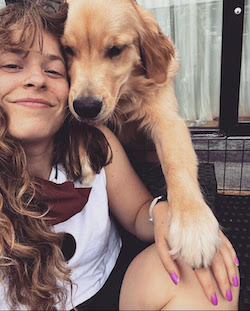|
|
 |
 |
| Want to earn credit toward classes? Learn about our internships program. |
|
|
 |
Catch The Mixer, Magnet's open improv jam, EVERY week @6pm. Free for students, $5 tickets for everyone else.
Sign-ups begin at 5:30pm |
|
|
 |
Magnet's musical improv jam, returns 2/9 @6pm & 2/23 @10pm. Free for students, $5 tickets for everyone else.
Sign-ups begin 30 min prior to curtain! |
|
|
|
|
|
|
|
|
|
|
|
|
|
|
|
|
 |
| Electives
And visit our Electives page often to see new offerings regurlarly
|
|
|
|
|
|
| Ask an Improviser
"What is the most important improv lesson you ever learned?"
|
|
|
| Performer Julia Schroeder |
 |
"I don’t know if this is the most important lesson I’ve learned, but I’ve always been drawn to how editing affects a show. I do think a great show relies on a group having a shared understanding of editing - the pacing, the possibilities of different types of edits, and how edits are utilized. Similarly, a lack of good editing can thwart an otherwise great show.
Here are a few lessons I learned surrounding editing that shape *my philosophy*
-
“If you get the urge to edit, it’s already too late.” I think Amy Poehler said this and I have no idea if I’m even getting it right, but I stand by it! The way I interpret it is, if you consciously notice you have the urge to edit, the moment has already passed. Meaning, your instincts are probably right so just learn to act on them automatically! And I would so much rather a scene get cut off a tad bit too short than drag on too long. Unless you have a really specific form you’re working on, you can always come back to a scene later in the show, so don’t feel bad for cutting off a scene before it completes a full-on story arc. If your teammates get a great edit point, it’s more likely they’ll be grateful to you for making them look good rather than be mad at you for cutting off their scene.
Also, a blackout scene in improv has the ability to reinvigorate a show. While any scene should have legs to go for hours, sometimes a blackout scene is exactly what’s needed.
-
Always be ready on the sidelines
I had a teacher in Detroit who wouldn’t let us lean against the wall on the sidelines because it literally, physically made us less likely to jump on an edit point. I employ that to this day. Actually there are some really unflattering photos of me on the sidelines during shows looking like I’m about to get subbed into the world cup final. For some reason my neck is always craned forward and my eyes are squinty and I have an intense focus face. But gosh dang it I am ALWAYS ready to edit
- Edit even if you don’t have an idea for what’s coming next. The edit and pacing of a show is more important than you having the perfect second beat premise or initiation line for the next scene. Should I have just added this to the first bullet point? Oh well it’s important 😘
- Don’t rely on the one person on your team who’s good at editing to edit every scene. Even if they don’t mind it. The audience will notice this and it’ll be weird. In a rehearsal, try a set or exercise where that person isn’t allowed to edit! Or do an exercise where the one person on your team who never edits is the only person who can edit!
-
It’s fun to try out different editing types 🥰
Transformative edits, split scenes, steal focus, steal a line, that one where you take an object or idea from a scene and say out loud what it is you’re bringing to the next scene (anyone know what I’m talking about lol?) are tools that can make a show unique and stand out. They can also give teams a whole new style to play around with!
Transformative edits, to me, can make you feel like you’re watching a magic show. Of course not every show or team plays this way, nor should they, but I think it’s cool to think that this one tool when employed can make you feel like you’re on drugs. I think the JTS Brown is the wildest example of how much a shared understanding of editing possibilities can influence a show. (It was originated in Chicago by Mick Napier and featured people like TJ Jagadowski, Jason Sudeikis, Peter Grosz, Craig Cackowski etc.) I had a team in Detroit that worked on a version of the JTS Brown, and it changed the way I thought about improv. It unlocked scenes and moments that none of us, or the audience, had ever experienced in improv before. If you get a chance to see a team do a JTS Brown, go see it!
I also just want to shout out Metal Boy as a team whose editing sensibilities I’m obsessed with.
- Bottom line? I do firmly believe that any scene can and should be able to turn into a 6 hour monoscene with good scenework, so I am not necessarily saying every scene has a perfect editing point and will be ruined if you don’t nail it. However, I’ve learned that all other things being equal, editing can drastically change the vibe of a show, and I love that"
Check out Julia in Megawatt on Rebel! Rebel!
|
|
|
|
|
|

